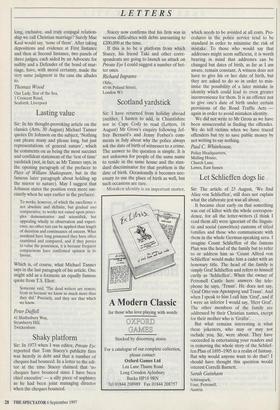Scotland yardstick
Sir: I have returned from holiday abroad (neither, I hasten to add, in Chiantishire nor in Cape Cod) to read (Letters, 16 August) Mr Gross's enquiry following Jef- frey Bernard's and Jenny Forbes's com- ments in July about why the police always ask the date of birth of witnesses to a crime. The answer to the question is simple. It is not unknown for people of the same name to reside in the same house and the stan- dard discriminator for that problem is the date of birth. Occasionally it becomes nec- essary to use the place of birth as well, but such occasions are rare.
Mistaken identity is an important matter.
which needs to be avoided at all costs. Pro- cedures in the police service tend to be standard in order to minimise the risk of mistake. To those who would say that addresses might seem sufficient, it is worth bearing in mind that addresses can be changed but dates of birth, as far as I am aware, remain constant. A witness does not have to give his or her date of birth, but they are asked to do so in order to min- imise the possibility of a later mistake in identity which could lead to even greater inconvenience for them. It is an offence not to give one's date of birth under certain provisions of the Road Traffic Acts again in order to avoid mistaken identity.
We did not write to Mr Gross as we have been unsuccessful in finding the offender. We do tell victims when we have traced offenders but try to save public money by not writing to say nothing.
Paul C. Whitehouse,
Police Headquarters, Mailing House, Church Lane, Lewes, East Sussex


























































 Previous page
Previous page